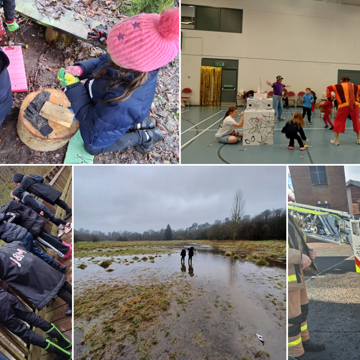After a childhood marked by challenging times and extraordinary resilience, 22-year-old Elena reflects on her journey as a trans woman in care - and the power of unconditional support from the foster carers who helped her thrive.
Elena has been through more than most young women her age. Taken into foster care as a baby, she faced significant health challenges in early childhood and wasn’t able to walk until she was two.
From a young age, Elena also began expressing her gender identity. At four, she started wearing princess dresses a simple act of self-expression that would eventually become central to her journey.
Thanks to the support of her foster carers, Linda and Phil, Elena was encouraged to be herself from the very beginning. But outside the safety of home, things were far more difficult. The bullying she endured became so severe it forced her to change schools and eventually leave education altogether at 14.
Despite everything, Elena has held firm in who she is. When we speak over the phone, she’s confident, warm, and full of insight. She’s also deeply reflective about how her life experiences have shaped her.
“People say oh, my God, you're so wise,” says Elena. “But I have to be. Because I’ve had to grow up in a different world.
“Other people at that age, they don't have to be so wise, and they don't have to grow up that fast, because the world is pretty much made to fit around them,” she adds.
When I speak to Linda, who has cared for Elena alongside her husband Phil since she was a baby, it’s very clear how proud she is of the woman she has become.
“She's so inspirational,” says Linda.
“Since she was four she dressed up like a girl, in princess clothes.
"She walked up to people I was talking to say, ‘I want to be a girl’. They would look at me and look at her in horror. I’d stare right back and say ‘yeah she does!’”
“She is absolutely amazing, the person she is today.”
That unwavering support gave Elena the confidence to come out publicly while still in school. Almost ten years ago, there was less awareness around what it means to be part of the trans community, so it was a move that took enormous courage.
“I'm proud of the fact that I was the first trans person to ever come out in in a school where there were not many people who could actually do it. And I'm proud that I actually had the courage to start wearing dresses and start wearing school uniform skirts, start putting my hair up and growing it out,” says Elena.
While staff at the school were supportive, students were not. The bullying she experienced was persistent and frightening.
“It was really, really difficult - I was chased out of school and down corridors, and I was chased home. Some people got a bit physical with me as well, like slamming me against walls.”
Despite this, Elena’s resilience never wavered. Today, she’s passionate about advocating for other young people going through similar challenges. She’s also found joy in creative expression - she’s a keen drummer and explores both music and art therapy as ways to process and heal.
When asked what advice she’d give to foster carers supporting young people exploring their identity, her message is simple: let them be themselves.
“It’s about having the freedom to express yourself. A boy wearing dresses doesn’t mean they are trans, it just means they are being a kid, dressing up and having fun.”
And, she adds, take them to Pride.
“Let them celebrate with different people, and let them figure out what their identify is, but finding out other people's backgrounds. This helps them make the decision themselves.”
Elena also speaks openly about her experience of gender-affirming surgery - and the need for carers and professionals to support not just the physical recovery, but the emotional journey too.
“Support what they want to do. If they want to have surgery, support them afterwards. It is a major thing, and it brings up some really complicated feelings afterwards. So make sure you are there for them emotionally as well.”
Having cared for Elena for over two decades, Linda takes the opportunity to reflect on her fostering journey of 25 years. Together with Phil, she has fostered more than 300 children and young people and fostering has been transformational - not only for the children she cares for, but for herself too.
“Absolutely no kids in care deserve what’s happened to them. Their parents haven’t had the right parenting either. And we have to break the cycle.”
“Fostering is an amazing thing to do, but it changes your life. I never knew what this side of the world was like.”
Linda is a family support foster carer with The Fostering Network’s Step Up Step Down programme - a model that helps prevent children coming into care by supporting families to stay together. But when children do come into care, she believes giving them space to express themselves safely is essential.
For Elena, the future looks bright. When asked what her next goal is, she doesn’t hesitate.
She wants to live independently. And maybe, she adds, get a boyfriend.
“I missed out on a lot of the experiences that young people have, so I want to start making up for lost time.”
